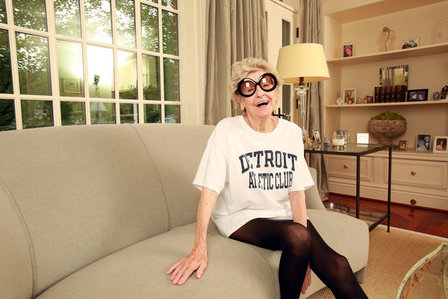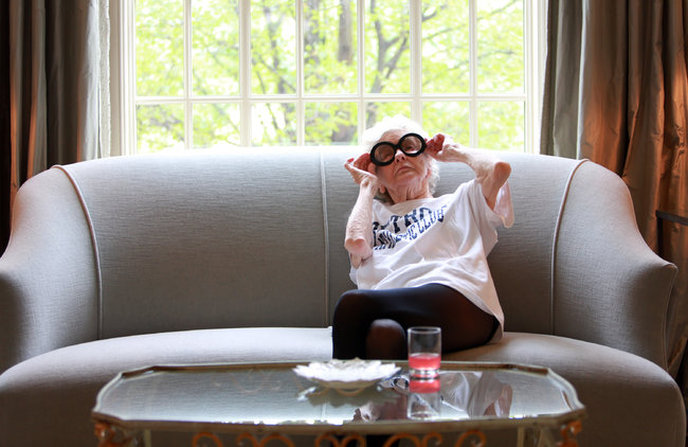 As Fierce as She Is Fragile: Elaine Stritch in Michigan By CHARLES ISHERWOOD (nytimes.com) BIRMINGHAM, Mich. — Even at 88, and in what might be called spectacularly frail health, Elaine Stritch can still make a theatrical entrance. Dinner is ready, in the condominium just next door to the one Ms. Stritch herself moved into last spring in this pristine Detroit suburb, near where she grew up and where much of her family resides. The crab cakes have been baked, the corn on the cob boiled, the spinach steamed, the cocktails stirred. Still, no sign of Ms. Stritch. 0 The minutes tick by, with a small frisson of anxiety building. The dinner’s hosts, Kim and Henry Hagood, who have become Ms. Stritch’s friends since she moved next door, can’t seem to get a response, either to a phone call or a knock on the door. We all know she’s not been well lately. Then, with little fanfare, there she is, a beaming smile on her face, a barking command to her caretaker on her lips. She is dressed with her usual, ahem, minimalism, in black tights, a Detroit Athletic Club T-shirt and not much else. Except for one new and unhappy accessory: a wheelchair. Ms. Stritch would doubtless prefer a modest string of pearls, but the last several months have not been kind. Before making her dramatic exit from New York — to theater lovers for whom Ms. Stritch is an ornery goddess, it was as if the Chrysler Building itself had picked up its skirts and skipped off to Detroit, of all preposterous places — Ms. Stritch took a bad fall one morning while leaving her longtime habitat, the Carlyle Hotel. Eye surgeries followed. Not long after that, Ms. Stritch took a second tumble, breaking a hip. Recovery was under way, and Ms. Stritch was settling down in Birmingham when she leaned over to brush her teeth one night at the bathroom sink, somehow lost her balance, and hit the deck again, fracturing her pelvis. So for at least another month or six weeks, she won’t be up and about, although for someone used to striding about with a commanding gait in those tights and heels, she seems to be taking her tumble into infirmity with some measure of acceptance. When asked what she’s been doing to keep herself occupied, the answer comes quickly: sleeping, often until 3 or 4 in the afternoon — late, even by the standards of showbiz folk. But she seems to relish this: “I’ve been preparing for this nap for a long time,” she says. Black humor has always come naturally to Ms. Stritch, whose long career, on the New York and London stage, and, more recently, on the television series “30 Rock,” has made her a well-armored survivor. Asked how she has been adjusting to her new life away from the spotlight, Ms. Stritch says, “I don’t really know, I’ve been too busy falling down. “It’s like a comedy,” she adds, “only a not so funny one.” Shortly after arriving in Birmingham, Ms. Stritch gave an interview to the Vanity Fair Web site, in which she seemed grousy and regretful. Grousing has always come naturally to this scaldingly frank woman, but she’s never made much of a song and dance about woulda, coulda, shoulda. “I’m thinking maybe I left a little early,” grumbled the woman once notorious for being the last to abandon any party. The gods apparently can’t take a joke, because for now, at least, even strolling next door is out of the picture for Ms. Stritch. And yet, perhaps because she’s been forced to settle down, her attitude toward her sudden bolt from the spotlight seems to be mellowing. “One thing I’m proud of myself for doing is combating those feelings,” she says, when those professed second thoughts are mentioned. “I don’t want to be a sad sack who made a mistake. I gotta have a home, a base, a place where all my shoes are. I’m settled. When I first moved in here, I had good friends around me, but I kept thinking, ‘I can’t imagine being here alone.’ But then I was alone, and everything was fine. Now I’d kill to be alone,” she adds, referring to the full-time caretaking she now requires. “I’ve come up against tougher things than this,” she adds. “I want to win at this decision.” If that still doesn’t sound like a ringing affirmation of her happiness, so be it. Putting up a veneer of good cheer has never been Ms. Stritch’s stock in trade. Putting it all out there is much more her style, and in conversations over dinner and in her kitchen the following day, Ms. Stritch remains the same blunt, acerbic, unedited personality she always has been, even if the pain killers she takes sometimes find her beginning a story, only to lose its thread (“I guess I just won’t be giving you that jewel,” she says grimly), or asserting an opinion only to proffer another view a few minutes later. Ms. Stritch dismisses with a violent wave of the hand the idea that she will wither away outside the media glare. “That takes me no time at all,” she says. “I’m not tied to all that. That’s not what I got into the theater for and it’s not what I got out of the theater because of.” But she also readily acknowledges that the adoration of an audience has been a sustaining force in her life, often when there wasn’t much else. And she would still be happy to return to work. “I would go to New York and do a play at the drop of a hat,” she says. The stage is where she has always felt most at home, and she seems both intrigued and intimidated by the idea of appearing in a potential revival of Edward Albee’s “Three Tall Women,” which Mr. Albee himself has suggested. (Ms. Stritch is particularly proud of her performance in the 1996 revival of Mr. Albee’s “Delicate Balance.”) The play is among Mr. Albee’s darkest, a troubling meditation on the rough waters of life at any and all stages, and the darkness that looms at the end. But in at least one respect, Ms. Stritch seems ready to embrace its themes: she talks about her own mortality with a frankness that almost seems like relish. What seems to irk her most about life — at least at present — is its gosh-darned expensiveness. The latest affront is a property tax bill she’s just been slapped with. Life in Birmingham hasn’t turned out to be the economic break she’d expected. “It’s more expensive than I ever dreamed,” she says. “I’d better die at my appointed time.” During the afternoon interview, Ms. Stritch’s niece Sally Hanley was on hand in the kitchen, having stopped by for a visit. Ms. Stritch’s move to Birmingham was motivated by fatigue with the heady bustle of New York (“I’m tired of the energy”) and a desire to settle down where she had family close at hand. She says she’s enjoyed seeing more of them, although even here the greeting-card sentiment goes quickly through a paper shredder. “I don’t want to see my family all the time,” she adds, “and they’re delighted, I’m sure, to be aware of that.” Ms. Hanley adds genially, “We just show up at the door.” Ms. Stritch also likes the idea of having family at hand to arrange matters after she’s gone. “If I drop dead here tomorrow morning, I call Sally, and they come and they take over,” she says, with charming illogic. She’s already made all the arrangements for her interment. (On the gravestone, she says, her epitaph will be a single word: “Later.”) “It’s kind of nice to have that all behind me,” she explains. “It costs a fortune, by the way.” If the accidents that have laid her low physically have inspired some grim meditating on mortality (and money), Ms. Stritch, at least, does it with her customary wry panache. And in at least one respect, she’s striking out in a new, or at least a long-abandoned, direction. Somewhat surprisingly, given her 25 years of sobriety, Ms. Stritch recently began drinking alcohol again, on a modest scale: at dinner she had a cosmopolitan — preprepared and brought over by her caretaker in a plastic water bottle — and took two sips of Champagne. And during the interview the next day, there was the cosmo again, looking oddly like Hawaiian Punch, in a glass on the table. She does not fear that one cosmo will lead her back down into alcoholism, partly because her diabetes requires such careful management, but also because she no longer feels so acutely the sting of insecurity that booze softened. “I was always trying to prove something about myself,” she muses, “and alcohol helped get me through that. But now I’m not escaping from anything. I’ve got a few questions answered.” Not all of them, of course. Ms. Stritch feels there is one aspect of life she has yet to master, and now finally has the time to attempt: simple satisfaction. When asked what her larger purpose was in removing herself from the city that adored her, sustained her, and then came to tire her, she grows reflective. “I’d like to discover life,” she says. “Quite frankly I don’t know how to be happy. I have not a clue. I only serve — and I don’t say that with any grandeur. I just serve others through entertaining. That’s when I am happy. I’m not just delighted with myself when I’m entertaining,” she adds sarcastically, “but I’m happier than when I’m not.” Elaine Stritch in her new place in Birmingham, Mich. “It’s like a comedy,” she said of her post-New York life in recent months, “only a not so funny one. (Photo: Fabrizio Costantini for The New York Times)
0 Comments
Your comment will be posted after it is approved.
Leave a Reply. |
Vartali BlogNew York City events, news, fashion, celebrities, beauty tips, health & fitness, games, our latest promotion and more Categories
All
Archives
June 2015
LinksInfo |

